I made some progress. I coned my muzzle with Joe wood's took a few days ago. I don't know if this is what did the trick or if it's something else.
I went and shot today and it seems to help quite a bit. I must have had a very tight muzzle. There's a reference line on the coning tool that measures an exact 0.580. I slipped the tool into the bore and noted where it stopped on the tool ... Pretty far away from that line. I measured roughly where the tool stopped on the bore and it measured 0.577 or less.
Getting the ball started with the coned muzzle is much easier. I still have to use my short starter because the load is so tight but it's very easy get it started and don't have to pound on it endlessly anymore.
Now when pushing the ball down the rest of the way with my rod (~4 inches down from muzzle and further) it remains much tighter down to the bottom where as before coning it, it would be very easy and almost loose feeling going down passed 4" from muzzle.
I think it's possible that the muzzle was sizing/squeezing the ball down too much for the size of the bore down lower and maybe I wasn't getting a good seal. That "loose feeling " had gotten progressively looser feeling the more I had tried to smooth the bore with grey 3m pads over the last year, which I had done because it was so rough. I did use green 3m pads at one point. Maybe I had actually removed a good bit of metal in the mid/lower bore relative to the muzzle! I'm not sure but that is my hypothesis because:
Last year, it was hard to get the ball down start to finish. Then I went through the bore with 3m pads many times trying to make sure I didn't hit the muzzle much. The patches I'd recovered early on looked fine.
After that smoothing, and last time I shot and posted targets in the beginning of this thread, it was still extremely hard the first 4" and then almost loose feeling. I wasn't able to get any of these patches so I can't verify if there was any issues with sealing the bore.
After coning, it's now really snug the first 4" and remains snug the rest of the way.
And my groups were wayyy better today than last time!
I did change a couple of other things, but I don't think they made the difference that I saw today.
I shot at a different range today and it was not covered so I put sight hoods on. I'm usually at a covered range so I don't need the hoods. I also measured out about 25 charges with a scale before going to remove the variable of my powder measure technique (maybe it's not good technique?). I also tried to minimize the amount of involvement of my non trigger hand. I use it to support the toe like most do when shooting bolt rifles and found when I flinch that hand really moves the butt. So I started using it only for support and minimized the amount of grip/pinching of the toe. It seemed to help a bit.
Other than those few items everything was pretty much the same.
First target target if 70gr I was feeling a bit jumpy and had a couple of accidental trigger pulls. Orange dot is 1.5". I think this load is probably better than that... I think I struggled to see the dot a bit at first
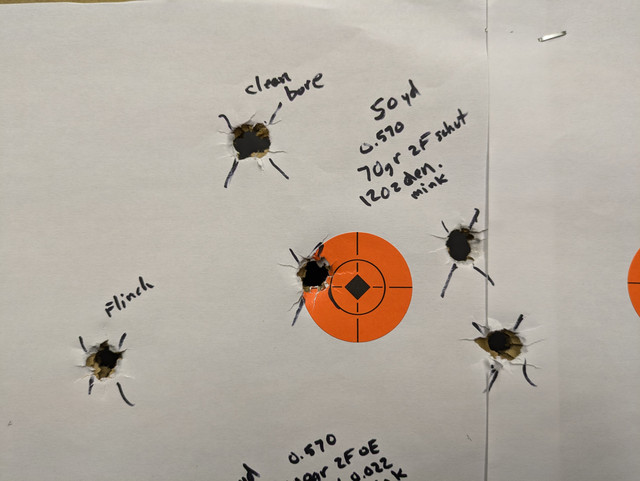
This target I was seeing if there was much difference when swabbing the bore between each shot. Same load. And.... A few young kids came to ask my about my "cannon". They were blown away and I let them shoot a couple times. They're the high shots.
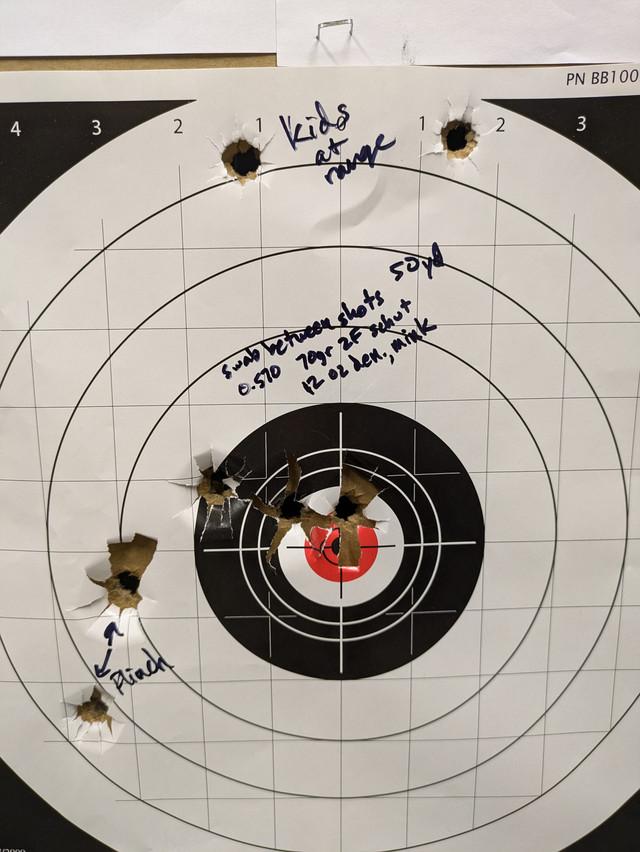
This target I decided to test it 100gr 2f OE I had leftover from when I had a 45-90 1886. I sold that gun:/ aimed at lower Orange dot.
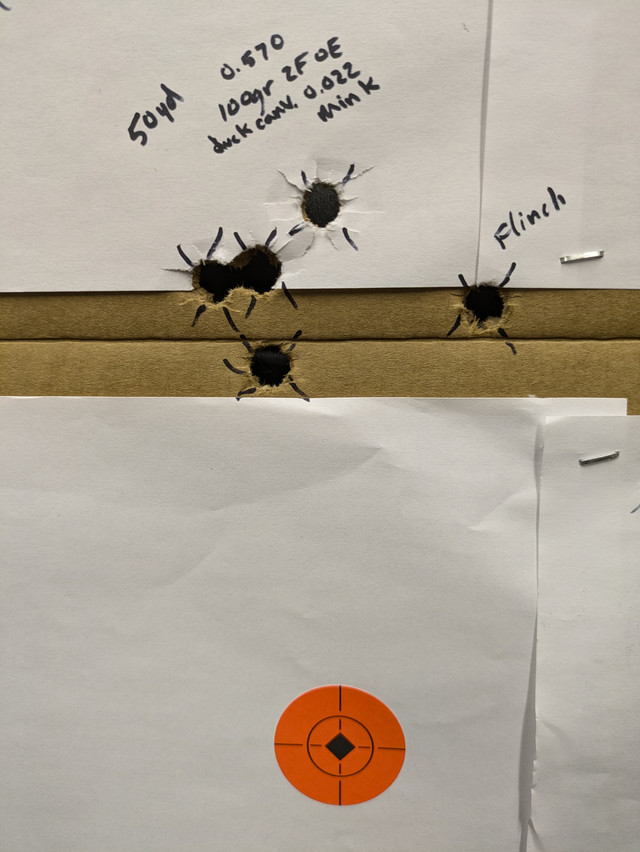
This target is a full 120gr measure, but all weighed with my scale. An actual 126gr 2f schuetzen by weight.
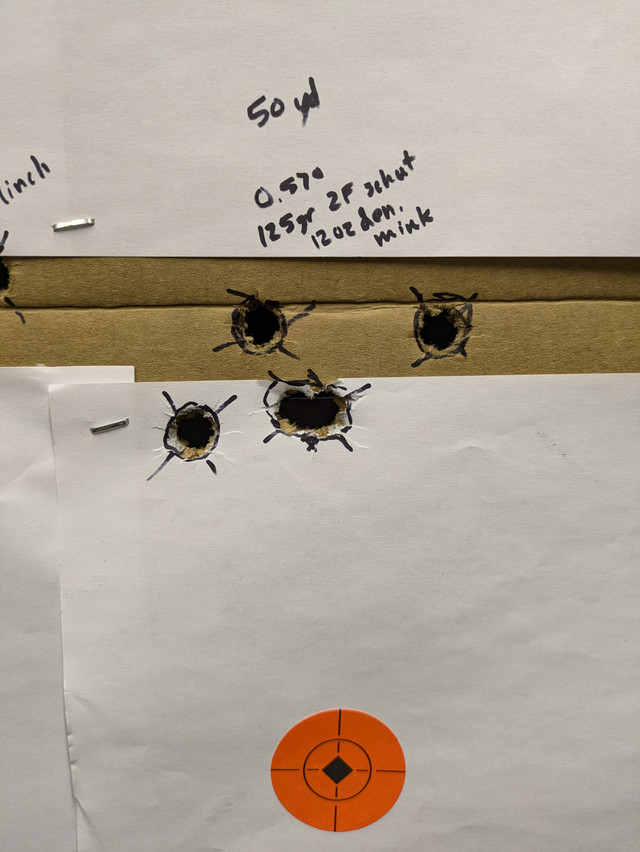
This is the 126gr schuetzen load at 105 yards! About a 5" group. There's an errant shot not on the target ... I think it might be one of those high holes.
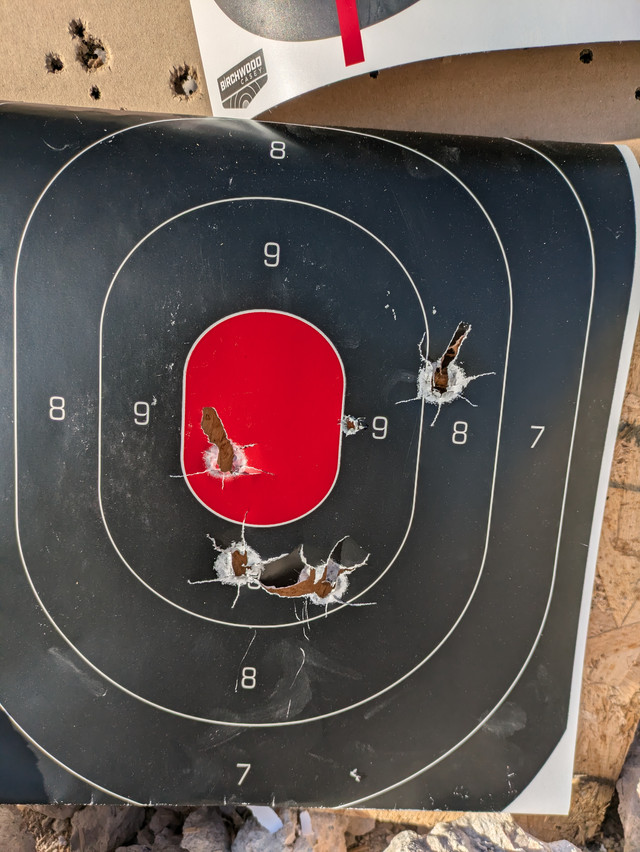
So what made the biggest difference? I don't know. I would say it's either the coning or weighing the charges. Probably the coning... Which doesn't make a lot of sense because no one has stated that coning has improved their accuracy. But, this barrel is an oddity to me. I think the evidence stated above about how the ramming the ball down the mid/lower bore before coning felt looser than after coning shows that maybe the bore diameter had become out of whack through my bubba'd lapping.
I forgot about the patches. It was really hard to find any patches at this range amongst all the trash from the heathens that leave It behind.
Bore/powder side
Ball side













